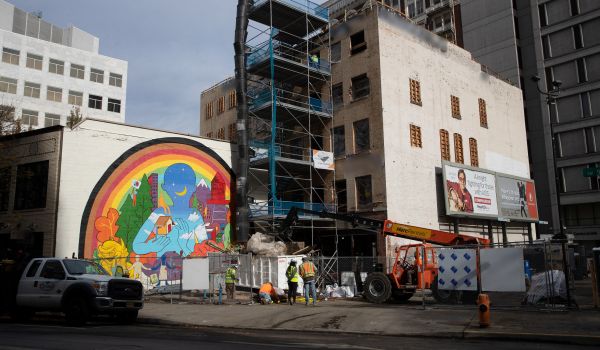Through peer-to-peer compacts and direct negotiations with the U.N., city leaders took unprecedented action on climate change and immigration last year, despite federal stonewalling. In 2018, municipal officials appear to be pooling their legislative heft on another issue receiving little support from the White House: opioid abuse.
In 2017, the Trump administration promised to produce some “really tough, really big, really great advertising” to persuade Americans to “Just Say No,” according to the New York Times. But the president has so far offered little in the way of funding for the communities harmed by the opioid epidemic, which killed nearly 64,000 U.S. citizens in 2016. Instead, he’s attempted to pass trillion-dollar cuts to Medicaid and proposed slashing the Office of National Drug Control Policy by 95 percent, New York Magazine reports.
It’s in this federal environment that cities have decided to sue — en masse. According to the Guardian, more than 60 U.S. cities have filed lawsuits against the makers of prescription pain killers like OxyContin, Percocet and fentanyl. In late January, New York and Philadelphia joined their growing ranks.
“More New Yorkers have died from opioid overdoses than car crashes and homicides combined in recent years,” New York Mayor Bill de Blasio said, announcing the lawsuit. “‘Big Pharma’ helped to fuel this epidemic by deceptively peddling these dangerous drugs and hooking millions.”
Here’s a rundown of the more notable cases.
New York City
New York City’s case, filed in New York state supreme court on January 23, goes after Purdue Pharma, creator of OxyContin, Endo, maker of Percocet and Cephalon Inc. (now part of Teva Pharmaceutical Industries) which manufactures fentanyl lozenges, among others. From the New York Times:
The lawsuit … alleges that the opioid crisis was caused by the deceptive marketing of drugmakers, and by distributors bringing large amounts of prescription painkillers into the New York market. All of this has caused the city to spend millions of dollars on substance abuse treatment programs, hospital services, emergency medical services and law enforcement.
The Times also points out that New York has been slow to respond to the crisis it’s now suing over. Last year, de Blasio announced a plan to reduce opioid deaths through outreach, treatment and law enforcement — but the effort came deep into his tenure.
A spokesperson for Purdue Pharma told the paper that the company “vigorously” denied the city’s allegations, and was “deeply troubled by the prescription and illicit opioid abuse crisis.”
Philadelphia
Philadelphia has suffered a higher rate of overdose deaths than any other major American City, according to the Centers for Disease Control and Prevention (CDC). Things are so bad, the city has been forced to set up a dedicated EMS unit just for overdose response, NBC Philadelphia reports.
Mayor Jim Kenney announced the city’s lawsuit in mid-January. Like New York, Philadelphia is accusing manufacturers and distributors of deceptive marketing practices and seeking damages to reimburse the city for its costly response. The suit names Teva Pharmaceuticals, Cephalon Inc., Endo and Purdue Pharma.
“City agencies have incurred large, burdensome, unnecessary and avoidable costs to address the crisis,” City Solicitor Sozi Pedro Tulante said when the action was announced, according to NBC Philadelphia. “It is our duty to devote all resources we can to help protect the public from further perils and to finally put an end to the practices which are the root of this epidemic.”
After the filing, Teva Pharmaceuticals, Endo and Purdue Pharma, among others, said they were committed to curbing illegal use of their products. Endo and Purdue Pharma denied the city’s claims, NBC Philadelphia reports.
Chicago
The Windy City was an early adopter, filing its lawsuit against Purdue Pharma, Cephalon Inc., Endo and others in 2014. That suit also alleged that the manufacturers had “deceptively marketed opioid painkillers like Percocet and OxyContin for chronic pain management, even though the companies knew the drugs were ineffective at treating chronic pain and carried a high risk of addiction,” Time reported in 2014.
“[The companies] knew — and had known for years — that opioids were too addictive and too debilitating for long-term use for chronic non-cancer pain,” the complaint stated. “In order to expand the market for opioids and realize blockbuster profits, Defendants needed to create a sea-change in medical and public perception that would permit the use of opioids for long periods of time to treat more common aches and pains, like lower back pain, arthritis, and headaches.”
The case is still ongoing, according to the New York Times. To date, city lawyers have received roughly 10 million pages of documents and held hundreds of interviews.
Everett, Washington
The northern Washington city is certainly not the biggest or most well-known plaintiff, but its suit, filed against Purdue Pharma last spring, is unique. From NBC News:
While other suits against the company by states and municipalities have accused Purdue Pharma of deceptive marketing — allegedly playing up OxyContin’s effectiveness while playing down its addictiveness — Everett’s lawsuit is the first to claim the company knew its drugs were being diverted and did nothing to stop it.
In particular, the complaint outlines a drug ring that began with a sham clinic in Los Angeles and ended with a kingpin running OxyContin on the streets of Everett. The unravelling was detailed in a Los Angeles Times investigation that triggered the idea for Everett’s lawsuit.
Purdue Pharma disputed the allegations in the lawsuit and said in a statement that the city painted “a flawed and inaccurate portrayal of events that led to the crisis in Everett.”
Baltimore
Baltimore’s law department filed its lawsuit at the end of January. In it, officials go after research and development as well as marketing.
The suit “alleges that the drug manufacturers have funded unscrupulous research that led to biased findings about the dangers of opioid pills and spread false information to doctors and consumers,” according to the Baltimore Sun. “The city accuses distributors of failing to properly report suspicious pill orders as required under federal and Maryland law.”
The suit names drug makers Purdue Pharma, Cephalon Inc., Janssen (a part of Johnson & Johnson), Actavis Generics and Endo Health Solutions and distributors McKesson, Cardinal Health and AmerisourceBergen, the Sun reports.
Other municipalities suing manufacturers and distributors include Haverhill, Massachusetts, Waterbury, Connecticut, Evansville, Indiana, Travis County, Texas, and many, many others.

Rachel Dovey is an award-winning freelance writer and former USC Annenberg fellow living at the northern tip of California’s Bay Area. She writes about infrastructure, water and climate change and has been published by Bust, Wired, Paste, SF Weekly, the East Bay Express and the North Bay Bohemian
Follow Rachel .(JavaScript must be enabled to view this email address)













